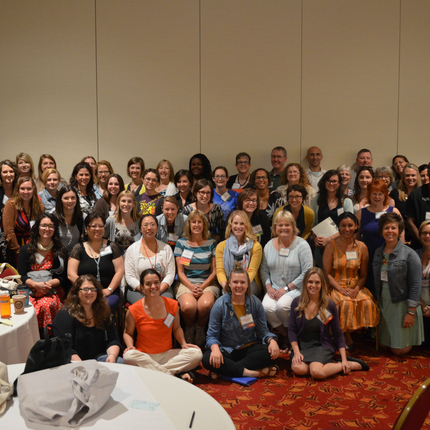The Center for Rural Affairs has the distinct honor of leading the National Farm to School Network’s Midwest Region and working with state leads in Iowa, Kansas, Missouri, Nebraska, North Dakota, Oklahoma, and South Dakota.
At a breakout session with nearly 100 Midwest attendees at the National Farm to Cafeteria conference in Wisconsin earlier this month, we wanted to hear each state’s unique challenges, barriers, and assets. The activity was a writing prompt inspired by Hemingway's famous six-word tale, “For sale: baby shoes, never worn.” This played out beautifully before we dug into the meat and bones of the challenges, the barriers, and assets for Farm to School.
Here are the responses:
Iowa - Together we grow healthy Iowa communities.
We learned that Food Corps and ISU Extension Outreach have taken a strong role in Iowa school districts, schools, community gardens, engaging parents, students, teachers, and other community members. Regional food hubs are also creating easier connections from farm to cafeterias, and help with minimal processing.
Nebraska - Welcoming Heartland, broadened minds, enriching experiences.
From Nebraska, we heard about a program growing to four schools in 2016 to 2017 that is teaching organic practices growing foods in the garden and greenhouse, then procured to the cafeteria and/or student-run farmers markets.
Missouri - Show me local farm fresh foods.
Across the state of Missouri, schools and engaged communities are the experts in collaboration, capitalizing on it in nearly every Farm to School program. It is not unusual to see five to eight collaborative organizations working together in Missouri on one awesome project. Related: they also brought the most people to our session!
Kansas - Growing (healthy) change with passion & dirt.
Kansas food policy councils are activating and playing a strong role in how schools approach wellness, health of the students, and healthy habits as a community, designing smarter Farm to School programs based on those goals.
South Dakota - Farming, Ranching, Gardening - Working on it!
Schools in Native communities of South Dakota are growing and introducing local, traditional foods into their menus. Farm to school serves not only as a health initiative, but as a tool to reclaim their food sovereignty and address food deserts.
Oklahoma - Empowering families with gardening and nutrition.
This summer Oklahoma Department of Ag is bringing the schools to the farms by using a USDA Specialty Crops block grant to organize farm tours for food service directors in several districts, reconnecting them to area growers.
North Dakota - Put our state on your plate.
North Dakota Departments of Agriculture and Public Instruction teamed up to support two statewide Farm to School conferences this year, both in May, and one on each side of the state to ensure a geographic approach to Farm to School.
One common priority is this: getting locally-sourced, nutritious foods on our youth’s plates, and showing them how to bring that into their lives by teaching them about food, how to grow it, how to prepare it, and how to eat it.
The 8th National Farm to Cafeteria Conference on June 2 to 4, in Madison, Wis., allowed all 50 states, Puerto Rico, Virgin Islands, and Canada to gather together to have a richer discussion about Farm to School and its impacts. It’s pretty rare to get farmers, school administration, food service professionals, chefs, FFA, University Extension, State Departments, non-profits, service organizations and local governments in one place to talk and learn together.
Communities who gather around their kids realize the importance of Farm to School, and make systematic changes. Farm to School impacts communities socially, educationally and economically.




